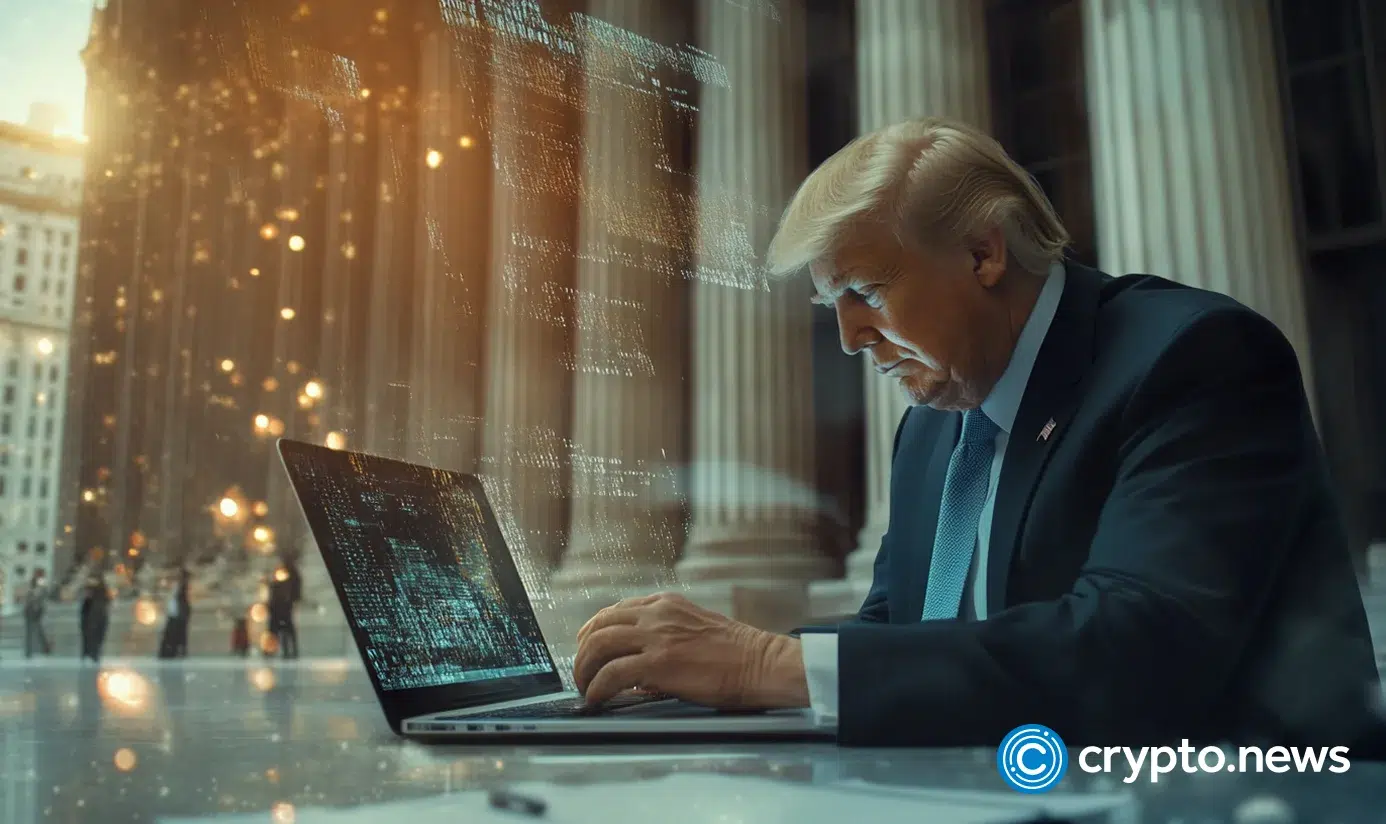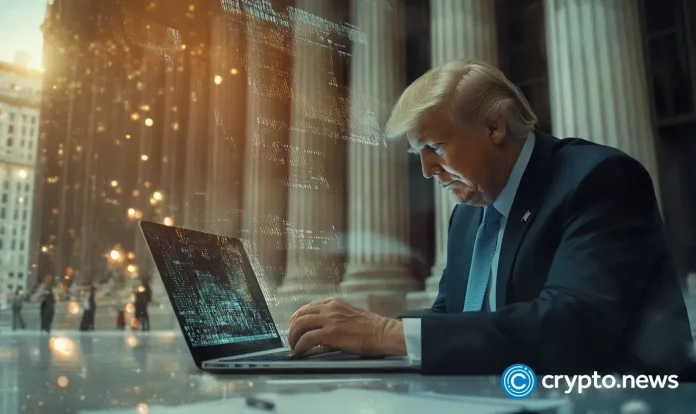
In a sweeping transfer hailed by crypto advocates, President Trump signed an govt order barring federal businesses from pressuring banks to chop off total industries—a tactic critics dubbed “Operation Chokepoint 2.0.” The order marks a decisive win for corporations lengthy frozen out of the monetary system, notably in digital property, however authorized analysts warn that regulators may nonetheless goal particular person corporations underneath the guise of threat administration.
Abstract
- For years, the FDIC pressed banks to disclaim providers to purchasers concerned in crypto transactions
- Donald Trump signed an govt order titled “Guaranteeing Truthful Banking for All People,” prohibiting such practices
- Nic Carter warns banks could proceed to disclaim providers, unlawfully disguising politically motivated denials as business-driven
Operation Chokepoint 2.0 is cancelled
Whereas Operation Chokepoint was by no means formally confirmed as critics described, the allegations gained traction in early 2023 when enterprise capitalist Nic Carter and others claimed U.S. regulators had been informally pressuring banks to chop ties with crypto corporations. They cited account closures, regulatory warnings about crypto dangers, and heightened scrutiny of financial institution–crypto relationships after the collapses of Silvergate, Signature, and Silicon Valley Financial institution.
The brand new anti-debanking govt order is subsequently thought-about a win for the U.S. crypto group. The principle assertion of the Guaranteeing Truthful Banking for All People order reads:
“It’s the coverage of america that no American ought to be denied entry to monetary providers due to their constitutionally or statutorily protected beliefs, affiliations, or political opinions, and to make sure that politicized or illegal debanking isn’t used as a instrument to inhibit such beliefs, affiliations, or political opinions. Banking choices should as an alternative be made on the premise of individualized, goal, and risk-based analyses.”
The order isn’t aimed toward solely defending the cryptocurrency area. It mentions the Obama-era Operation Chokepoint that, they allege, focused political opponents (the initiative targeted on rooting out fraud).
With the so-called Biden-era Operation Chokepoint 2.0, the crypto group claimed that sure hedge funds and different organizations had been blocked from banking providers due to their involvement with digital property.
Usually, these purchasers had been saved unaware of the explanations behind the service denial. Some had been instructed it’s due to crypto. Coinbase’s Chief Authorized Officer, Paul Grewal, identified that companies not concerned in crypto operations didn’t face such issues.
Carter, in addition to Sen. Cynthia Lummis, Paul Grewal and distinguished crypto advocate Caitlin Lengthy tried to make clear the illegal practices largely coming from the Federal Deposit Insurance coverage Company, with proof stemming from the paperwork obtained by way of Freedom of Info Act request.
Quickly, the problem was dropped at the eye of the federal government. The Securities and Alternate Fee chairman Jerome Powell criticized the FDIC’s tips. Trump expressed his destructive stance on the debanking too. Vice President JD Vance prematurely declared Operation Chokepoint 2.0 lifeless again in Might 2025. Caitlin Lengthy criticized Vance, stating it was an exaggeration as a result of the instruments focusing on the crypto trade had been nonetheless in place.
Notable reactions to the order
Lengthy was amongst those that commented on the anti-debanking govt order. Lengthy mentioned it has some “hidden gems” and lauded the White Home’s understanding that federal banking regulators aren’t those to belief.
Lengthy factors out that the order creates an overseer entity, the Small Enterprise Administration, exterior of the banking sphere that shall be supervising banks to ensure they aren’t denying providers. Caitlin Lengthy stresses that it signifies that the White Home doesn’t belief the businesses that existed earlier than: the Federal Reserve, the Workplace of the Comptroller of the Forex, and the FDIC.
She notes that the individual appointed to move SBA, Kelly Loeffler, is a bitcoiner, that means that the pursuits of crypto companies are actually higher protected. Lengthy factors out that the legislation doesn’t embody the phrase “crypto” in any respect and incorporates a broad notion of “politicized or illegal debanking.” We’re but to see if such a broad definition shall be misused.
The shortage of accuracy in figuring out what’s illegal debanking was reasonably criticized by Nic Carter. In accordance with him, the regarding sort of debanking is denying the providers to a consumer as a result of the financial institution considers that serving this entity is politically too dangerous, though the entity is law-abiding.
Carter refers to Cato’s Nick Anthony put up, during which he outlined the distinction between governmental and operational debanking. The latter is predicated on the enterprise choices, as an illustration, if purchasers can’t pay for the providers or shareholders protest offering providers to some purchasers (for instance, in 2019, following criticism, JPMorgan determined to cease financing non-public prisons).
In distinction, governmental debanking is when the federal government pressures banks to disclaim providers to some purchasers primarily based on political desire. It will probably happen by way of direct request or by adopting some insurance policies focusing on sure financial institution purchasers.
In accordance with Carter, the order “will show troublesome to find out whether or not a financial institution fired a consumer due to their political opinions or line of labor, or as a result of the financial institution seen that consumer as excessively pricey (probably as a result of regulatory strain).” He corroborated:
“Who’s to say […], whether or not the consumer was fired as a result of they had been donating funds to crowdfunding in Gaza or as a result of the financial institution felt that that may entail extra burdensome compliance prices for sustaining the account? Regulators aiming to redline sure industries may, in idea, proceed to make debanking sure purchasers right into a (rational) enterprise resolution, quite than a discretionary one. My proposed answer, as we are going to cowl, is to focus extra on regulatory transparency and equity, quite than zeroing in on the banks themselves. The EO does go away some wiggle room right here, delegating extra evaluation to the Treasury.”
So, whereas Sen. Lummis has already declared that Operation Chokepoint 2.0 won’t ever occur once more, Carter proposes options to abolish it utterly, which haven’t occurred but, in response to him.
Carter continues, saying “banks want to have the ability to shut accounts quite than being caught serving unprofitable or excessively dangerous purchasers.” Carter’s answer is quite forcing banks to be extra clear and accountable, in order that purchasers would know, in a well timed and exact method, why they’re being fired, and so forth.
Greater than that, Carter requires eradicating the “confidential supervisory data” seal. Banks ought to be incentivized to remain accountable and clear, he argues. But, the chief order leaves area for future politically motivated debanking disguised as operational debanking, as the choices shall be made by banks.

